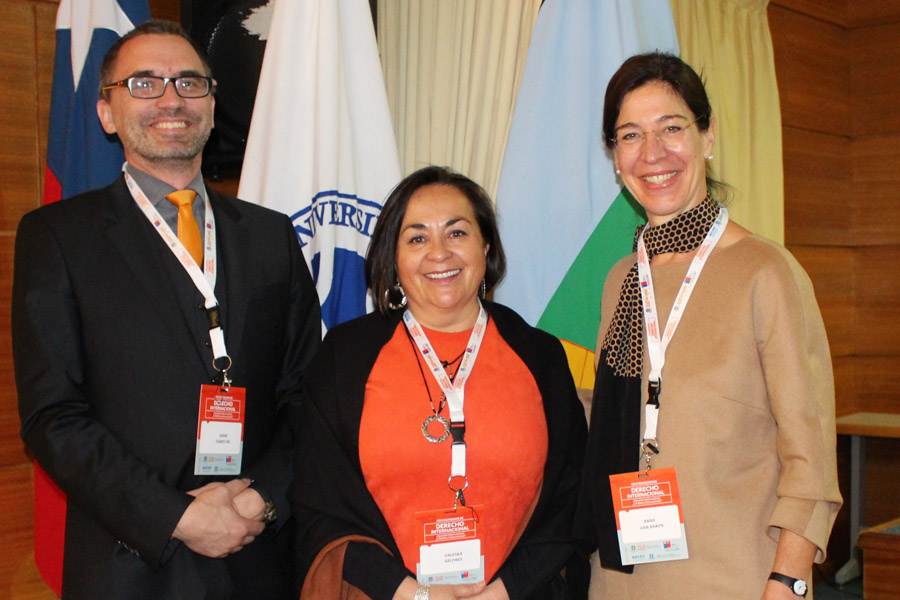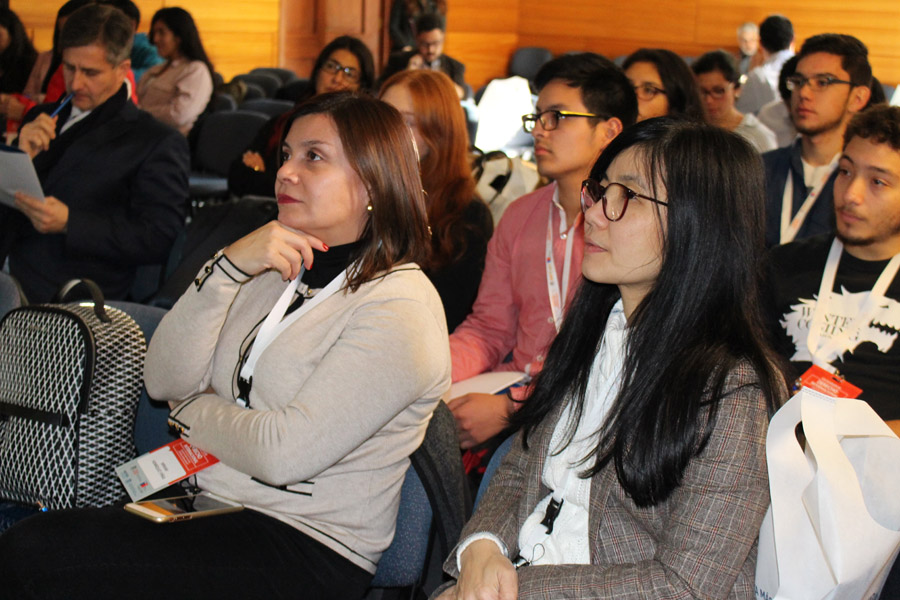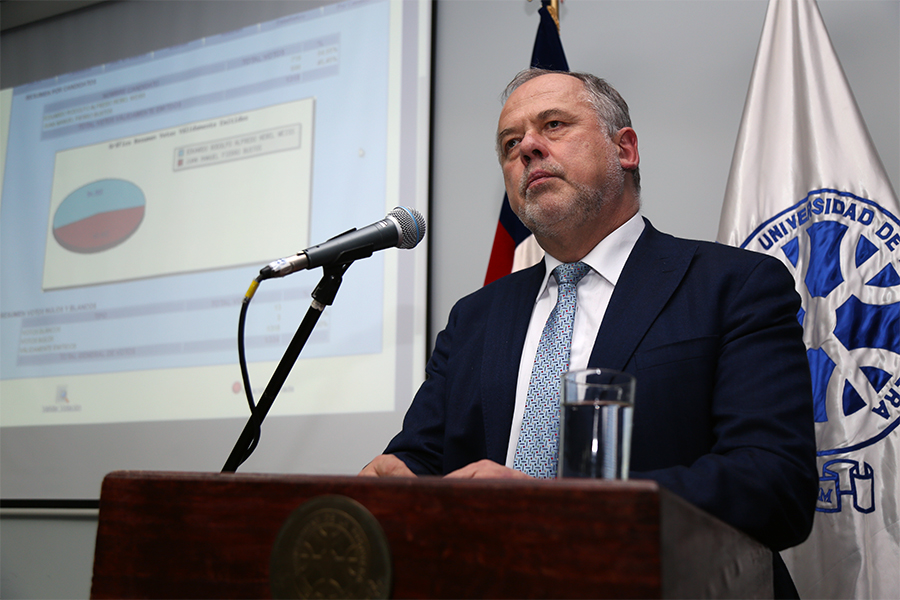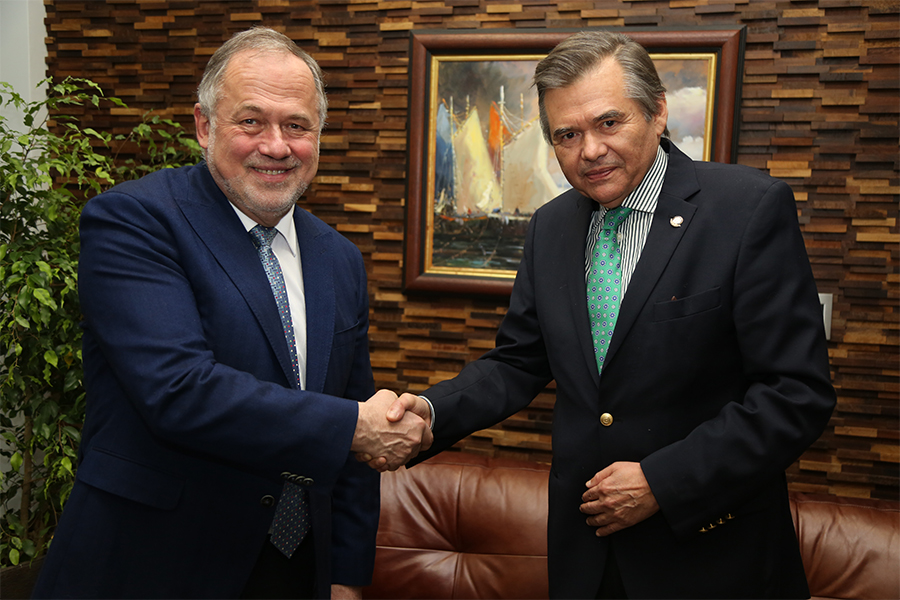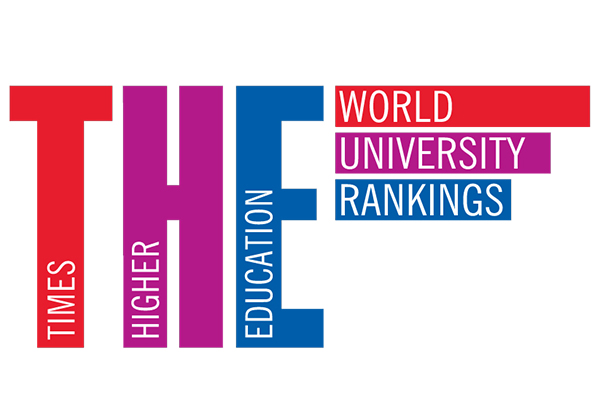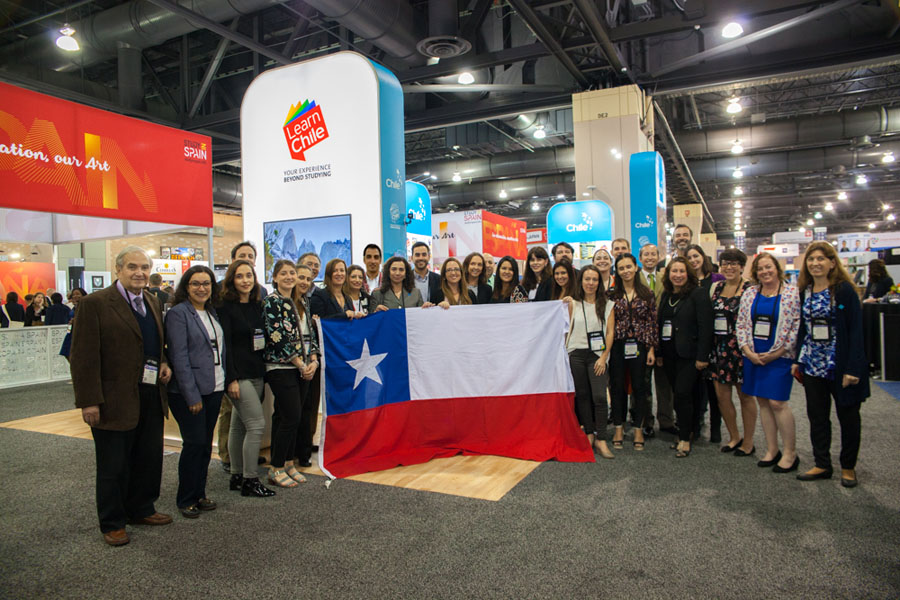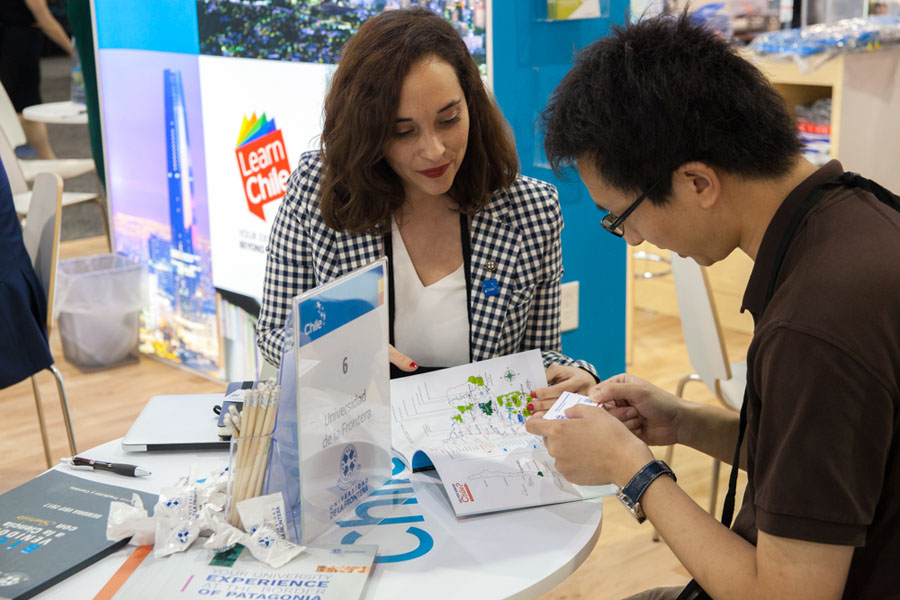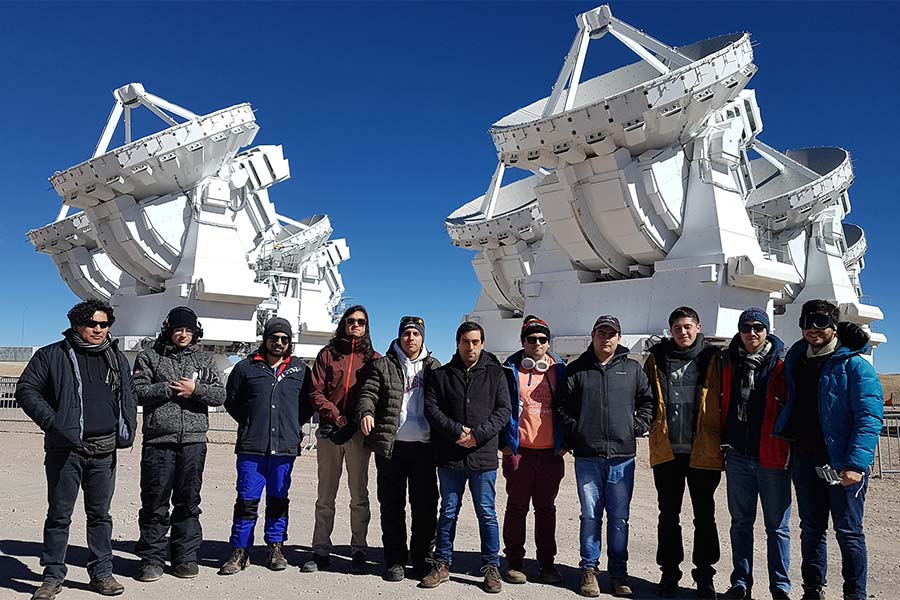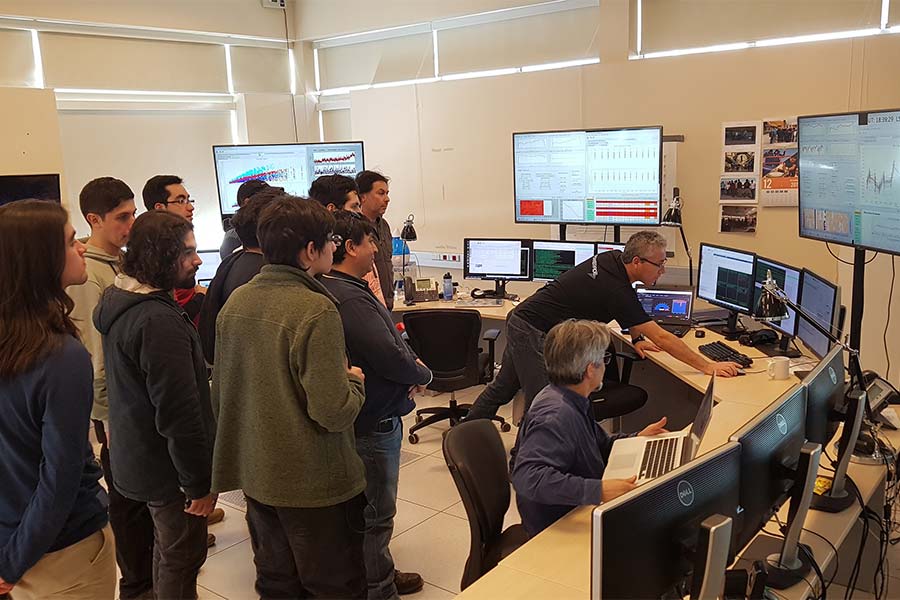|
The latest version of this meeting took place at Pucón Campus of the UFRO, with the participation of national and international speakers and over one hundred participants from all over the country who work in the field of law. |
More than a hundred people participated in these VIII Symposia on International Law, called “International Law or International Politics?”. The event took place at Pucón Campus of the Universidad de La Frontera and has been organized by the Law Department and the Faculty of Law and Business (FCJE-UFRO), sponsored by the Chilean Society of International Law in cooperation with the UFRO Research Center on International Challenges. The director of the Chilean Society of International Law, Andrea Lucas, pointed out: “I think that Dr. Jaime Tijmes thought about a very suggestive topic in terms of thinking about the limits of international law and politics, which become blurred a lot of times regarding the matters we deal with.” The academic and director of the Law Department, Dr. iuv. Jaime Tijmes, claimed that “these symposia started with a brilliant inaugural session and went on as a space of high-level academic dialogue with speakers from Chile and Latin-America. It was also important to count with the participation of female speakers, who have all been selected because of the quality of their proposals, and who are an example to follow for our students, especially, because at the international level, the position of women at the universities is still disadvantageous.” In this context the academic stated: “This event has been important in order to make the Law Department known, not only because of the high rate regarding scientific productivity, but also regarding the organization of scientific events, what contributes to the presence of the UFRO; and, in conclusion, in order to position our university as a place with gender equity and inclusion.” The inaugural exposition of the symposium was presented by Dr. Anne van Aaken of the University of St. Gallen, Switzerland, who presented the topic “Why Social Science makes International Lawyers better Lawyers”. GUESTS Alejandro Jara, the former ambassador and Deputy Director-General of the World Trade Organization (WTO), was also among the guests and presented the International Economic Law Panel. “Law also reflects politics and public policies and evolves over time as the standard of any legal system. These Symposia are very fruitful regarding the exchange of opinions, since they help to share knowledge, to develop opinions and to present recent research. They are a very valuable exercise.” The event was financed by the Universidad de La Frontera and the Regular Fondecyt (Chilean National Fund for Scientific and Technological Development) Project No. 1171085: “Norms and public opinion: a case study about the TPP and the TTIP” (2017-2019), which is being developed by the director of the Law Department at the FCJE-UFRO, Dr. iur. Jaime Tijmes.
Written by: Karen Campos
Faculty of Law and Business |
|
After an intense election process that started on April 9th and took months of hard work that was based on dialogue, proposals and the debate of ideas, the Electoral Commission of the Universidad de La Frontera announced the triumph of Dr. Eduardo Hebel. |
After a promising election process, the two strongest candidates competed in the second round of the Rectorial election at the Universidad de La Frontera and, since last Friday, we know the name of the new elected Rector: Dr. Eduardo Hebel, an academic at the Faculty of Medicine. “I am very pleased by the support I received. The campaign has not been easy, but above all clean and ethic. And in this regard, I am very pleased by the support I received by the academic community. Our goal was to win and now, to put the project we presented to the university community into action. The essential point is that the winner is our University,” Dr. Hebel stated. The announcement of the election results took place at the Aula Magna, in Room 201, where the candidates and their supporters came together on last Friday, 8th of June, to hear the final result of these elections. According to the report of the Electoral Commission, TRICELA, out of a total of 1,318 votes validly cast, Dr. Eduardo Hebel won with 54.55 % (719 of the votes cast). His competitor, Dr. Juan Manuel Fierro, obtained 45.45 % (599 of the votes cast). Dr. Eduardo Hebel will be in this office – the most important one – for four years. He will assume in August, after the Inauguration Ceremony in which he will be installed as the next University Rector. The ceremony will take place at the Aula Magna in presence of public and private guests. Written by: Communications Division
|
|
For the first time, the UFRO entered this ranking that evaluates the quality of young universities (50 years or less) and is in third place among the Chilean universities. |
This is another recognition of the quality and prestige of the Universidad de La Frontera. On June, 6th of 2018, the Times Higher Education (THE) Rankings published the Young University Rankings 2018 that places the UFRO in the range 201-250 at the international level and in third place among the Chilean institutions that have been judged. This THE ranking judges the best universities in the world that exist for 50 years or less. This year, it included 250 institutions in 55 different countries. The Universidad de La Frontera entered for the first time, and is in third place out of the five Chilean universities that have been considered. In this regard, the rector Sergio Bravo is proud of the incorporation of the UFRO in this ranking, since THE is of high international prestige and known for its complete and reliable measurements. “It is the first time that we have been considered by this ranking and we landed in third place among the Chilean young universities. This is an important and significant achievement which we should be proud of. At the same time, it should encourage us to keep working, with confidence in our indicators”, he pointed out. This ranking considers 13 performance indicators – the same ones as the THE World University Rankings – in universities of 50 years or less and analyses aspects such as teaching, research, quotes, international outlook, etc. The methodology has been carefully selected and recalibrated with adjustments regarding the weighting in reputation, in order to reflect the special qualities of the youngest universities. VIEW TIMES HIGHER EDUCATION YOUNG UNIVERSITY RANKINGS 2018
|
|
More than 500 representatives of universities from all over the world showed their interest in starting or strengthening an academic partnership with Chile. The Universidad de La Frontera actively participated in this international convention on international higher education. |
According to a report published by the Image of Chile Foundation, the scientific and technological achievements of Chile have been the most positive topic in the foreign press. It has been the best reference for the 19 establishments from Chile who participated in the NAFSA 2018 Annual Conference and Expo. The Universidad de La Frontera, represented by the International Affair´s Office, has been part of this important event, which took place in Philadelphia, USA, from May 29th to June 1st. Each year, about ten thousand educators and representatives of universities from all over the world come together in order to get to know the latest tendencies in higher education and it is the most important opportunity to create new networks for academic internationalization. “A lot of institutions explicitly said that Chile is the country in Latin America where they want to start their cooperation in the South Cone,” Marcos Avilez, the director of Learn Chile, which consists of 24 establishments of higher education in Chile and is supported by ProChile, said. They want to transform the country into a magnet in higher education for foreign countries. “It is our fifth time at this Expo, and as a country we show the academic offer of Chile and the characteristics that position us as one of the most desired destinations in our region,” he added. “I am pleasantly surprised by the diversity of the people who get in touch with us in order to establish an academic cooperation,” said Elvis Campos, the representative of the Universidad La Serena, which has just been incorporated into the Learn Chile network and participated for the first time at NAFSA. On this occasion, representatives of this brand got together with the University Mobility Network in Asia and the Pacific (UMAP) and with internationalization networks for universities that have just been crated in Ecuador, Colombia and Peru. The aim was to transfer knowledge and experiences and to create joint initiatives for educational cooperation abroad. “I think that the main challenge regarding internationalization of our countries is to take a look at our neighbors in order to find exchange opportunities and good practices and policies in the field of internationalization in higher education,” Herbert Guy, the general secretary of the Ecuadorian Network for Internationalization in Higher Education, pointed out. After about 500 meetings with universities from all over the world, the plan is to establish cooperation and student mobility agreements with universities in Europe and South America, as well as with countries in parts of the world which, until now, we explored less, such as China, Japan, India or Turkey, in order to create new networks and exchange scholarships for students, researchers and Chilean and foreign academics. Source: Learn Chile
|
|
The UFRO maintains collaborative work with the largest and most important Astronomic Observatory in the world, since 2014. |
The visit of directors and students of the Universidad de La Frontera at ALMA, the largest and most important astronomic observatory in the world, is an important event in the cooperation that lasts since 2014. The delegation was led by the dean of the UFRO Faculty of Engineering and Science, Rodrigo Navia; the Outreach coordinator, Iván Velásquez; the director of the Program in Physical Engineering, Robert Guzmán; and the academic of the Department of Physical Science, Pablo Díaz. It has been the second visit of directors of the university at ALMA, and their partnership serves for the development of initiatives and academic and professional collaboration. At present, the collaboration focuses on the field of big data (software) and will be extended to different fields of engineering (hardware), scientific operations, academic development and, in medium-term, technology transfer. “This cooperation with ALMA opens a new field for us, for internships and perhaps future jobs for engineers of different fields of expertise. Therefore, it is a field in which our students can acquire important skills for their future”, Rodrigo Navia, the dean of the Faculty of Engineering and Science, explained. He added that “we will elaborate a plan for the next two years, which will be reviewable each year, in which we will extend the collaboration spectrum we had so far and which basically focused on computer science. We are thinking about fields like electronics, mechatronics, physics engineering and telematics. We want more students to be able to do their internship at ALMA. Eventually, this plan will also include the possibility for postgraduate students to do internships there.” EXPERIENCE AND OPPURTUNITIES The delegation also consisted of ten students of the Physical Engineering, Civil Industrial Engineering with specialization in Computer Engineering and Electronic Engineering programs, who started to work in the field of astroengineering, an UFRO initiative led by the academic Patricio Galeas. “The visit was a tremendous opportunity in order to see how the work at the international level, regarding infrastructure, technology and human resources, works”, Felipe Garrido, student in Physical Engineering, said. “ALMA is a model to aspire, no matter which path we take or the resources we have. This experience marks the future for the ones who want to follow a path towards cutting-edge research and engineering applied on science or technology”, he added. According to that, Iván Aburto, student in Civil Industrial Engineering with specialization in Computer Engineering, said that “it was a unique experience, since we were able to share with professionals who guided us and explained some of the tasks they regularly work on. Here in Chile, there is a wide range of working options for engineers in the different fields. Opportunities exist, you just have to know how to find and make use of them”, he assured. “It is important to emphasize the quality of our visit, as well as the politeness and deference the ALMA experts treated our delegation with, while receiving us and showing us around the installations”, Navia concluded. Written by: Mauricio Antivil Morgado |





